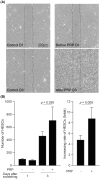Transcriptomic profiling analysis of human endometrial stromal cells treated with autologous platelet-rich plasma
- PMID: 36704119
- PMCID: PMC9868347
- DOI: 10.1002/rmb2.12498
Transcriptomic profiling analysis of human endometrial stromal cells treated with autologous platelet-rich plasma
Abstract
Purpose: To clarify the mechanisms of intrauterine platelet-rich plasma (PRP) infusion that support embryo implantation in in vitro fertilization treatment.
Methods: Blood and endometrial samples were collected from four infertile women. Human endometrial stromal cells (HESCs) were cultured and passaged equally into four cell culture dishes in each patient. Two were treated with PRP twice, and the other two were treated with vehicle. Subsequently, two cultures with and without PRP were decidualized with 8-bromoadenosine 3',5'-cyclic AMP and progesterone for 5 days.
Results: The gene expression in undifferentiated or decidualized HESCs with and without PRP was compared. In the microarray analysis, 381 and 63 differentially expressed genes were detected in undifferentiated and decidualized HESCs, respectively. In the undifferentiated HESCs, PRP was found to promote the gene expression associated with cell growth, tissue regeneration, proinflammatory response, and antibiotic effects. In decidualized HESCs, PRP was found to attenuate the gene expression involved in cell proliferation and inflammation by inhibiting the expression of phosphoinositide 3-kinase signaling.
Conclusions: Platelet-rich plasma regulates the reprogramming of cell proliferation and inflammation depending on menstrual cycle phases in an appropriate manner, suggesting that PRP has the potential to increase endometrial thickness in the proliferative phase and improve immune tolerance in the secretory phase.
Keywords: cell growth; decidualization; endometrium; phosphoinositide 3‐kinase signaling pathway; platelet‐rich plasma.
© 2023 The Authors. Reproductive Medicine and Biology published by John Wiley & Sons Australia, Ltd on behalf of Japan Society for Reproductive Medicine.
Conflict of interest statement
All authors have no conflicts of interest to declare relevant to this study.
Figures




Similar articles
-
Progesterone triggers Rho kinase-cofilin axis during in vitro and in vivo endometrial decidualization.Hum Reprod. 2021 Jul 19;36(8):2230-2248. doi: 10.1093/humrep/deab161. Hum Reprod. 2021. PMID: 34270712
-
Endometrial inflammasome activation accompanies menstruation and may have implications for systemic inflammatory events of the menstrual cycle.Hum Reprod. 2020 Jun 1;35(6):1363-1376. doi: 10.1093/humrep/deaa065. Hum Reprod. 2020. PMID: 32488243
-
Growth regulation by estrogen in breast cancer 1 (GREB1) is a novel progesterone-responsive gene required for human endometrial stromal decidualization.Mol Hum Reprod. 2017 Sep 1;23(9):646-653. doi: 10.1093/molehr/gax045. Mol Hum Reprod. 2017. PMID: 28911214 Free PMC article.
-
Use of Intra-uterine Injection of Platelet-rich Plasma (PRP) for Endometrial Receptivity and Thickness: a Literature Review of the Mechanisms of Action.Reprod Sci. 2021 Jun;28(6):1659-1670. doi: 10.1007/s43032-021-00579-2. Epub 2021 Apr 22. Reprod Sci. 2021. PMID: 33886116 Review.
-
Effect of intrauterine infusion of platelet-rich plasma for women with recurrent implantation failure: a systematic review and meta-analysis.J Obstet Gynaecol. 2023 Dec;43(1):2144177. doi: 10.1080/01443615.2022.2144177. Epub 2022 Nov 17. J Obstet Gynaecol. 2023. PMID: 36397660
Cited by
-
Stanniocalcin Protein Expression in Female Reproductive Organs: Literature Review and Public Cancer Database Analysis.Endocrinology. 2024 Aug 27;165(10):bqae110. doi: 10.1210/endocr/bqae110. Endocrinology. 2024. PMID: 39186548 Free PMC article. Review.
-
The number of previous implantation failures is a critical determinant of intrauterine autologous platelet-rich plasma infusion success in women with recurrent implantation failure.Reprod Med Biol. 2024 Feb 29;23(1):e12565. doi: 10.1002/rmb2.12565. eCollection 2024 Jan-Dec. Reprod Med Biol. 2024. PMID: 38435746 Free PMC article.
-
Comprehensive single-cell transcriptome analysis of autologous platelet-rich plasma therapy on human thin endometrium.Sci Rep. 2025 Apr 26;15(1):14637. doi: 10.1038/s41598-025-99468-w. Sci Rep. 2025. PMID: 40287476 Free PMC article.
-
Value of Intrauterine Autologous Platelet-Rich Plasma Therapy on Endometrial Receptivity: A Literature Review.Curr Med Sci. 2023 Dec;43(6):1075-1083. doi: 10.1007/s11596-023-2816-4. Epub 2023 Dec 2. Curr Med Sci. 2023. PMID: 38041791 Review.
-
Evolution of biotechnological advances and regenerative therapies for endometrial disorders: a systematic review.Hum Reprod Update. 2024 Oct 1;30(5):584-613. doi: 10.1093/humupd/dmae013. Hum Reprod Update. 2024. PMID: 38796750 Free PMC article.
References
-
- Scott RT. Introduction: subchromosomal abnormalities in preimplantation embryonic aneuploidy screening. Fertil Steril. 2017;107(1):4–5. - PubMed
-
- Treff NR, Franasiak JM. Detection of segmental aneuploidy and mosaicism in the human preimplantation embryo: technical considerations and limitations. Fertil Steril. 2017;107(1):27–31. - PubMed
-
- Liu S, Diao L, Huang C, Li Y, Zeng Y, Kwak‐Kim JYH. The role of decidual immune cells on human pregnancy. J Reprod Immunol. 2017;124:44–53. - PubMed
-
- Gellersen B, Brosens JJ. Cyclic Decidualization of the human endometrium in reproductive health and failure. Endocr Rev. 2014;35(6):851–905. - PubMed
-
- Kasius A, Smit JG, Torrance HL, Eijkemans MJC, Mol BW, Opmeer BC, et al. Endometrial thickness and pregnancy rates after IVF: a systematic review and meta‐analysis. Hum Reprod Update. 2014;20(4):530–41. - PubMed
LinkOut - more resources
Full Text Sources
Molecular Biology Databases
Research Materials
